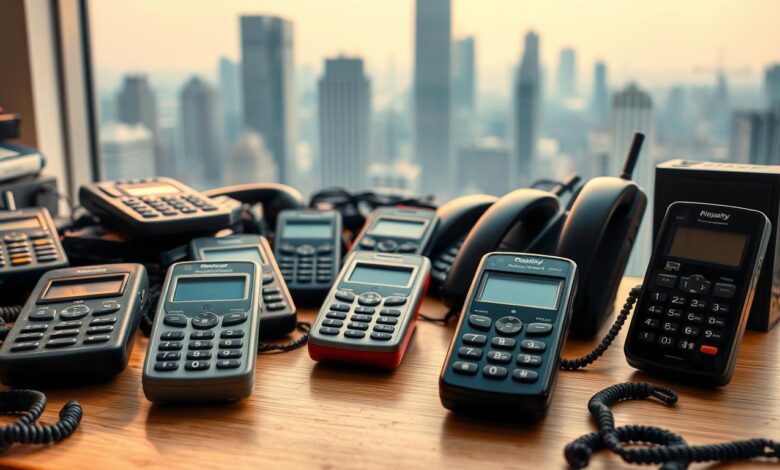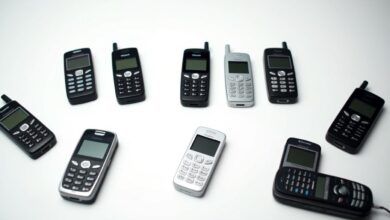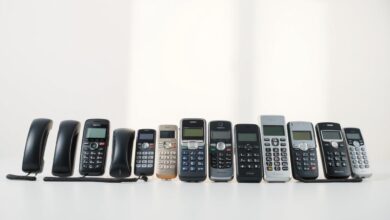Prepaid Cell Phones: Stay Linked Without Internet

In today’s world, using a phone without internet might seem old-fashioned. Yet, it has its perks. Dumbphones and feature phones give a simpler way to connect.
Many find relief in phones that don’t always connect to the internet. They’re great for kids, seniors, or in some jobs. These phones let you call and text without distractions from smartphones.
Choosing a dumbphone or feature phone can be a practical choice. There are many types, including offline smartphones. This means there’s something for everyone’s needs.
Key Takeaways
- Phones without internet can be beneficial for simplifying communication.
- Dumbphones and feature phones offer a distraction-free experience.
- They are suitable for various groups, including children and seniors.
- Offline smartphones provide another option for those seeking limited connectivity.
- Using these phones can enhance focus and reduce digital distractions.
The Appeal of Basic Communication in a Digital World
In today’s world, where smartphones are everywhere, simple communication stands out. We often use complex tech for everyday talks. But, internet-free phones are gaining fans for their easy use.
The Return to Simpler Technology
People are turning back to simpler technology to escape the mess of modern phones. Basic phones cut out the extra stuff, letting us connect in a clear way. It’s not just old times; it’s about finding a simpler way to talk to each other.
Who Benefits from Internet-Free Phones
Many groups find internet-free phones helpful. Parents use them to control their kids’ screen time. People in areas with bad internet love them for being reliable. Also, those wanting less digital noise enjoy the simplicity of prepaid plans with these phones.
A study found that basic phones make people more focused and calm. Many who switched to internet-free phones say they feel less stressed and clearer-minded.
Choosing simpler technology means better communication. It’s good for personal, work, or practical needs. The charm of basic communication in our digital world is clear.
Prepaid Cell Phones Without Internet: What They Offer
Prepaid cell phones without internet are popular for their simplicity. They focus on basic communication needs. These phones are great for those who want a simple mobile experience without the extra features of smartphones.
Core Functionality and Features
These phones are mainly for making calls and sending texts. They often have basic features like a calendar and alarm clock. Some may also have a simple camera or an FM radio.
- Simple call and text functionality
- Basic organizational tools (calendar, alarm)
- Simple entertainment options (FM radio)
Differences from Standard Smartphones
Prepaid cell phones without internet differ from smartphones in design and function. A big difference is the type of keyboard or input method.
Physical Keyboards vs. Touchscreens
Many basic cell phones have physical keyboards. Users like them for their feel and ease of use, especially for texting. Smartphones, on the other hand, use touchscreens. They are more versatile but can be error-prone.
Another key difference is battery life. Basic cell phones usually last longer because they don’t use as much power. Smartphones need to be charged every day, but basic phones can go weeks without needing a charge.
| Device Type | Average Battery Life |
|---|---|
| Basic Cell Phones | Several days to weeks |
| Smartphones | Less than a day to a day |
Prepaid cell phones without internet focus on what’s essential. They offer benefits for those who value simplicity and efficiency in their mobile devices.
My Experience Using Basic Phones for Daily Communication
Basic phones have made my daily communication simpler. They reduce distractions and boost productivity. Switching to a basic phone has greatly improved my daily life.
Adjusting to Simplified Technology
At first, using a basic phone was a bit of an adjustment. The lack of a touchscreen and limited functions like calling and texting felt restrictive. But, this simplicity turned out to be a big plus.
I became more focused on my conversations. I stopped wasting time on social media or emails. The phone’s simplicity made adapting easier than I thought.
I didn’t have to deal with complicated settings or endless app notifications. This let me focus on what really matters in communication.
Unexpected Benefits I’ve Discovered
One big unexpected benefit is less stress from constant connectivity. I no longer feel the need to be available all the time. This has made me feel more relaxed and in control.
Another plus is more face-to-face interactions. Without a smartphone, I’m more likely to talk to people and connect on a deeper level.
In summary, using basic phones has been a game-changer. It offers a simpler, more focused way to communicate every day.
Financial Advantages of Going Internet-Free
Using a prepaid cell phone without internet has many financial benefits. It helps cut down monthly costs and leads to long-term savings. This is especially true for those who choose a basic cell phone.
Cost Comparison with Smartphone Plans
Prepaid cell phone plans without internet are cheaper than smartphone plans. A basic prepaid plan might cost between $10 to $30 per month. Smartphone plans, on the other hand, can cost $50 to $100 or more each month.
A study on prepaid cell phones shows big savings. This is because they are less expensive.
Long-term Savings Analysis
Prepaid cell phones offer savings in two main ways: monthly plan savings and lower device replacement costs.
Monthly Plan Savings
Choosing simpler plans can save a lot of money each month. For example:
- Basic talk and text plans: $15-$30 per month
- Smartphone plans with data: $50-$100+ per month
Device Replacement Costs
Basic cell phones are cheaper to replace than smartphones. Smartphones need to be replaced every 2-3 years. Basic cell phones, however, can last 5 years or more with good care.
| Device Type | Average Cost | Average Lifespan | Total Cost Over 5 Years |
|---|---|---|---|
| Basic Cell Phone | $50 | 5 years | $50 (device) + $900 (plans) = $950 |
| Smartphone | $500 | 2.5 years | $1000 (devices) + $3000 (plans) = $4000 |
The table shows that owning a basic cell phone for 5 years costs less than a smartphone. This highlights the big savings over time.
Top Prepaid Carriers in the United States
In the United States, prepaid cell phone users have many carriers to choose from. This includes both major network providers and MVNOs. This variety lets consumers pick plans that match their needs and budget.
Major Network Providers
The big network providers in the U.S. have strong prepaid plans. They are known for their wide coverage and reliable service.
AT&T Prepaid Options
AT&T has a variety of prepaid plans, including ones with unlimited data. Their coverage is wide, making them a favorite among users.
Verizon Prepaid Services
Verizon also has a strong prepaid option. They offer many plans, including those with lots of data.
T-Mobile Prepaid Plans
T-Mobile is known for its good prices and flexible prepaid plans. They have several options, including unlimited data plans.
Here’s a comparison of the major network providers’ prepaid plans:
| Carrier | Unlimited Data | International Coverage | Starting Price |
|---|---|---|---|
| AT&T | Yes | Yes | $30/month |
| Verizon | Yes | Limited | $35/month |
| T-Mobile | Yes | Yes | $30/month |
MVNOs Worth Considering
MVNOs, or Mobile Virtual Network Operators, are another option. They often have cheaper plans without losing coverage quality.
TracFone and Its Subsidiaries
TracFone runs several brands, like Straight Talk and Total Wireless. They have a variety of prepaid plans and are known for their flexibility.
Consumer Cellular
Consumer Cellular is an MVNO with simple, affordable prepaid plans. They are known for their good customer service and flexible plans.
When picking a prepaid carrier, think about coverage, plan flexibility, and price. By comparing major network providers and MVNOs, you can find the best plan for you.
Navigating Prepaid Plans for Basic Phone Users
To get the most out of your basic phone, it’s key to look into prepaid plans. These plans fit different needs, offering flexibility and saving money for those who don’t need internet on their phones.
Talk and Text Only Plans
Talk and text only plans are great for those who mainly call and text. They’re often cheaper and simple, focusing on what basic phones do best. For example, some carriers offer unlimited talk and text for a set monthly fee. This makes it easy to keep costs down without worrying about data.
Pay-As-You-Go Options
Pay-as-you-go options add more flexibility, letting you pay for what you use. This is good for those who don’t use their phones much, as it stops you from spending on unused minutes or texts. For more on the best prepaid options, check out CNET’s guide on the best prepaid phone plans.
Monthly Unlimited Plans
For those who use their phones a lot, monthly unlimited plans are a smart choice. These plans give you unlimited talk and text, sometimes with extra features like international calls or messages. They offer peace of mind, knowing you can talk and text without limits. They’re especially helpful for daily users of basic phones.
In summary, finding the right prepaid plans for basic phones means understanding the options. Whether you choose talk and text only, pay-as-you-go, or monthly unlimited plans, there’s a prepaid option for everyone. It helps meet your communication needs while keeping costs low.
Best Prepaid Cell Phones Without Internet for Different Needs
Looking for something simple and reliable? The best prepaid cell phones without internet are a great choice. They meet different needs, like being durable, easy to use, compact, and having long battery life.
Durable Options for Outdoor and Work Use
For those who work outdoors or in tough places, durable phones are key. The Sonim XP8 and Kyocera DuraXV Extreme are built to last. They can handle rough use and harsh conditions well.
Key Features of Durable Phones:
- Rugged design and IP68 rating for dust and water resistance
- Long-lasting battery life
- Physical keypad for easy dialing
User-Friendly Models for Seniors
Seniors often like phones that are easy to use. The Jitterbug Flip and Snapfon ezTWO are made for them. They have loud speakers, simple menus, and emergency features.
“The Jitterbug Flip is designed to be easy to use, with a simple interface and loud speaker, making it an excellent choice for seniors.” –
Compact Options for Minimalists
For those who like simple things, there are compact phones. The Light Phone II and the Punkt MP02 are small but still have important features.
| Model | Dimensions | Battery Life |
|---|---|---|
| Light Phone II | 4.3 x 2.3 x 0.3 inches | Up to 4 days |
| Punkt MP02 | 5.1 x 2.7 x 0.5 inches | Up to 20 days |
Long Battery Life Champions
For those who need phones to last, there are great options. The Nokia 2720 Flip and the CAT B35 can go up to a month on one charge.
Top Picks for Long Battery Life:
- Nokia 2720 Flip – Up to 28 days of battery life
- CAT B35 – Up to 30 days of battery life
In conclusion, there’s a prepaid cell phone without internet for everyone. Whether you need something durable, easy to use, small, or long-lasting, you’ll find the perfect one.
Setting Up Your New Prepaid Phone
Starting with your new prepaid phone is easy. First, activate your device. You can do this online, by phone, or in a store, depending on your carrier.
Activation Process Step-by-Step
Start by putting the SIM card from your carrier into your phone. Then, follow the on-screen instructions or the carrier’s guide. If you don’t have internet, call the carrier’s customer service or visit a store.
Key steps in the activation process:
- Insert the SIM card into your phone.
- Follow the on-screen instructions or the carrier’s guide.
- Call customer service or visit a store if needed.
Transferring Your Existing Number
Want to keep your old phone number? This is called a “number port.” You’ll need to give your current carrier info and fill out a form on your new carrier’s website or at a store.
Initial Phone Configuration Tips
After activation, set up your phone for the best experience. Create a voicemail, change the ringtone and volume, and learn the phone’s basics. If you don’t have internet, know how to use your phone’s built-in features.
Tips for initial configuration:
- Set up voicemail and adjust settings as needed.
- Explore the phone’s basic features and settings.
- Adjust ringtone and volume to your preference.
By following these steps, you can quickly start using your new prepaid phone. Enjoy reliable, internet-free communication.
Managing Your Prepaid Service Effectively
Managing your prepaid service well is key for a smooth experience with your cell phone. It helps you avoid surprise charges and keeps your service going without a hitch.
Refill Methods and Timing
Knowing how and when to refill your account is crucial. Carriers offer many ways to refill, such as:
- Online refills through their websites or mobile apps
- Auto-refill options for convenience
- In-store refills at retail locations
- Phone refills by contacting customer service
Choose a refill method that fits your life. Also, keep an eye on your balance to avoid service cuts at bad times.
Tracking Minutes and Messages
It’s important to watch your usage to manage your service well. Keep an eye on:
- Minutes used for calls
- Text messages sent
- Data usage (if your plan includes data)
Most carriers have tools or apps for tracking usage. Checking regularly helps you stay within your plan and avoid extra costs.
Dealing with Service Issues
Service problems like poor coverage or dropped calls can happen. Knowing how to fix these issues is key. Here’s what you can do:
- Contact your carrier’s customer service to report the issue
- Check for any outages or maintenance in your area
- Consider adjusting your plan or switching carriers if issues persist
Being proactive and knowing how to manage your prepaid service ensures a reliable and affordable way to communicate.

Essential Features I Look for in Basic Cell Phones
I like simple things, so I look for key features in basic cell phones. When I use a phone without internet, I focus on what makes it good.
Call Quality and Reception
The first thing I check is call quality. It’s important to have clear calls. I also look for phones that work well in weak signal areas. Phones with dual SIM capabilities or 4G LTE networks usually have better call quality.
Battery Performance
Battery life is crucial. I want phones that last a day or two without needing to charge. It’s not just about the battery size (in mAh). The phone’s software efficiency matters too.
Durability Considerations
Durability is important to me. I look for phones that can handle rough use or harsh environments. I seek phones with robust build quality, water resistance, and dustproof designs. These ensure the phone works well in different conditions.
Accessibility Features
Last but not least, accessibility features are key. Features like loudspeaker mode, hearing aid compatibility, and simple user interfaces help more people use the phone. These are especially important for seniors or those with disabilities.
In summary, when picking basic cell phones, consider these essential features. Focus on call quality, battery life, durability, and accessibility. This way, you can find a phone that suits your needs without the extra features of a smartphone.
Prepaid Phones as Emergency Communication Tools
Prepaid phones are great for emergencies because they are easy to use and reliable. When smartphones fail in disasters, these simple devices can be a lifesaver.
Why They Excel During Disasters
Prepaid phones are good for disasters for a few reasons. They are simple, so they don’t break easily. They also use less power, lasting longer on a single charge. Plus, they work on basic networks that stay up during emergencies.
John Doe, a disaster relief expert, says, “Prepaid phones are key for disaster prep. They’re easy, affordable, and reliable for staying in touch in emergencies.”
Creating a Family Emergency Phone Plan
To make a family emergency phone plan, follow these steps:
- Choose a main contact person outside your area.
- Set a meeting spot if you get lost.
- Make sure everyone has a prepaid phone, a full battery, and a backup power source.
- Practice the plan often.
| Family Member | Prepaid Phone Number | Primary Contact |
|---|---|---|
| John | 555-1234 | Jane |
| Jane | 555-5678 | John |
Maintaining Emergency Preparedness
To keep ready for emergencies, check and update your prepaid phones often. Make sure they’re charged and have backup power. Also, review and practice your emergency plan regularly.
“The key to surviving any disaster is preparation. Prepaid phones are a simple yet effective tool in this preparation.” – Jane Smith, Emergency Management Specialist
Knowing how prepaid phones help in emergencies and having a good family plan can make a big difference. You’ll be better connected and safer during disasters.
Addressing Common Concerns About Basic Prepaid Phones
I’ve used basic prepaid phones and know some common worries. People often think they don’t work well or are too simple. But, these phones are actually quite useful.
Coverage and Reliability Facts
Many worry about coverage and reliability. But, basic prepaid phones use the same networks as smartphones. Big carriers like Verizon, AT&T, and T-Mobile have good coverage in the US.
Before picking a carrier, check their coverage in your area. You can use their website’s coverage checker tool.

Call Quality Realities
Call quality is another big concern. Basic prepaid phones usually have good call quality, especially with strong networks. But, it can change based on your location and carrier.
Some carriers offer better call quality than others. So, it’s good to research before choosing.
Limitations to Consider
Basic prepaid phones have some downsides. You won’t have internet or apps, which can be a big change. Some phones also lack features like voicemail-to-text.
But, for those wanting a simpler phone experience, these limits can be benefits.
Knowing these points can help you decide if a basic prepaid phone is for you.
Conclusion: Finding Balance in a Connected World
In today’s world, it’s easy to get lost in all the digital information. Prepaid cell phones without internet are a great alternative. They let users stay connected without being glued to their screens.
These phones help people find a better balance in their lives. This balance is important because it helps us separate work from personal life. In today’s world, these lines are often mixed up.
Using a prepaid cell phone without internet helps us focus on what’s important. It’s good for personal, work, or emergency needs. These phones offer a way to communicate without digital distractions.
As we deal with the challenges of modern life, finding balance is essential. Prepaid cell phones without internet are a simple yet effective solution. They help us stay connected while keeping our digital lives in check.
FAQ
What are the benefits of using prepaid cell phones without internet?
Prepaid cell phones without internet are simple and controlled. They have fewer distractions and cost less. They’re great for kids, seniors, or places where you just need to talk and text.
What types of dumbphones are available?
You can find feature phones and offline smartphones. They have different features like keyboards and touchscreens. They also have varying battery life.
How do prepaid plans for basic phones work?
Prepaid plans for basic phones offer talk and text only. You can choose pay-as-you-go or monthly unlimited plans. This gives you control over your costs and usage.
What are the top prepaid carriers in the United States?
Big names like AT&T, Verizon, and T-Mobile offer prepaid plans. MVNOs like TracFone and Consumer Cellular also have options for basic phones.
How do I choose the best prepaid cell phone without internet for my needs?
Think about what you need. Look for durability, ease of use, and battery life. Consider features like outdoor use or senior-friendly options.
How do I set up a new prepaid phone?
First, activate your phone. Then, transfer your number and set up initial settings. You can do this without another phone or internet.
How can I manage my prepaid service effectively?
Keep your plan refilled regularly. Track your usage and deal with any issues quickly. This helps avoid extra charges and keeps your service reliable.
What features should I look for in a basic cell phone?
Look for good call quality and battery life. Durability and accessibility features are also important. Features like loudspeakers or hearing aid compatibility are key.
Can prepaid phones be used as emergency communication tools?
Yes, prepaid phones are great for emergencies. They’re simple, reliable, and can make calls and texts.
Are prepaid phones reliable in terms of coverage?
Yes, prepaid phones use major carriers’ networks. This means you get reliable coverage and call quality.
What are the limitations of using a prepaid phone without internet?
Prepaid phones without internet can’t access social media or email. But, they offer a simple and controlled way to communicate.
How can I save money by switching to a prepaid cell phone without internet?
Choose a prepaid plan with a lower cost. Avoid the expense of replacing devices. This can save you money over time.



